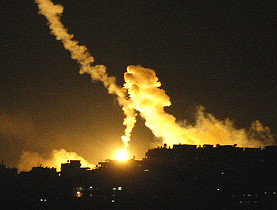The Monstrosity of War


Civilian deaths increase as Israel moves deeper into Gaza. (Photo: Abid Katib / Getty Images Europe)
“Foreseen for so many years: these evils, this monstrous violence, these massive agonies: no easier to bear.”
-Robinson Jeffers, American poet
Agence France-Presse reports that the first person killed when the Israeli military began to enter Gaza on Saturday was a Palestinian child.
On Sunday, a Palestinian woman and her four children were blown to pieces when Israeli warplanes bombed their home. They are among the 521 victims (at the time of this writing) of the ongoing air and ground assault on the Gaza Strip by a 9,000 strong force, which the Israeli government has launched on one of the most densely populated tracts of land in the world, home to 1.5 million Palestinians, half of them under 17 years of age.
“The ground invasion was preceded by large scale artillery shelling from around 4 P.M., intended to ‘soften’ the targets as artillery batteries deployed along the Strip in recent days began bombarding Hamas targets and open areas near the border,” Israel’s Haaretz newspaper wrote of the onslaught. “Hundreds of shells were fired, including cluster bombs aimed at open areas.”
Israel began the military assault on Gaza on November 4, breaking the truce that Hamas had observed for many months. It went on to block food supplies to be delivered into Gaza by the UN Relief Works and World Food Program. The next casualty was the crucial fuel delivery service used to run Gaza’s power plant. Finally, Israel banned journalists and aid workers from entering Gaza.
It is important to note that in mid-December, during a visit to Israel, UN Human Rights Investigator Richard Falk called the Israeli blockade of Gaza “a crime against humanity” and a “flagrant and massive violation of international law.”
Falk, a professor emeritus of international law at Princeton University and United Nations special rapporteur on human rights in the Palestinian territories, urged the UN to invoke “the agreed norm of a responsibility to protect a civilian population being collectively punished by policies that amount to a Crime Against Humanity.” Falk also called for an International Criminal Court investigation of Israeli military and civilian officials for potential prosecution.
For this, he was detained at Tel Aviv’s Ben Gurion Airport for 20 hours before being expelled from Israel.
As Israeli tanks and ground troops pour into Gaza to engage in the worst kind of combat (should we even measure types of warfare against one another?), urban warfare, the atrocities on both sides continue, and one may assume that the situation will only worsen with time, as it inevitably does in progressive stages of war.
“Operation Cast Lead” as Israel’s latest offensive is named, has claimed, since December 27, over 520 Palestinian lives. Gaza medical officials put the number of wounded at over 2,400, most of them civilians.
Hamas rockets have killed five Israelis, one of them a soldier and four of them civilians. As with Israeli attacks that kill and wound Palestinian civilians are a war crime, Hamas firing their grossly inaccurate rockets into Israel, which then wound and kill Israeli civilians, is also a war crime.
According to KPFA radio correspondent Sameh Habeeb, “Around 17 people [from the Al-Atatra family] were killed in Bait Lahia town north of Gaza. Amongst them were several children, two brothers, 20-year-olds and many old men who were all killed by one rocket.” Habeeb also reports of Israeli war planes striking water plants, dozens of houses, the use of white phosphorous incendiary weapons and of at least 15 mosques having been bombed. Dozens of people have been killed in the attacks against the mosques. Israeli Foreign Minister Ms. Tzipi Livni explains patiently, “But a war is a war; these things can happen. This is not our intention, but we cannot avoid completely any kind of civilian casualties. But the responsibility for this lies on Hamas’ shoulders.” The slaughter only compounds the hardships that Palestinians have suffered due to the severe shortages of food and medical supplies accruing from the two-year-old economic blockade imposed upon Gaza by Israel.
In 2006, Dov Weisglass, an adviser to the Israeli Prime Minister Ehud Olmert, said of the blockade: “The idea is to put the Palestinians on a diet, but not to make them die of hunger.”
The UN has warned that there are “critical gaps” in aid reaching Gaza, despite claims from Livni that aid was getting through.
Christopher Gunness, the UN Relief and Works Agency (UNRWA) spokesman, dismisses the claim that there is no humanitarian crisis as an absurdity. He informs us, “The organization for which I work, UNRWA – has approximately 9 to 10,000 workers on the ground. They are speaking with the ordinary civilians in Gaza … People are suffering. A quarter of all those being killed now are civilians [the majority of the over 2,400 wounded are civilians]. So when I hear people say we’re doing our best to avoid civilian casualties that rings very hollow indeed.”
> From Iraq, I had reported on how the US military regularly blockaded cities during military operations, disconnecting power, food, water and medical supplies. Let us not forget the March 2003 US invasion of Iraq followed 12 and a half years of genocidal sanctions against that country, which claimed the lives of half a million children. The people of Iraq, like the people of Gaza, had been placed on a “diet.”
Back in Gaza, the International Committee for the Red Cross said on Sunday its medical emergency team had been prevented by the Israeli military for a third day from entering the territory. Here again, is an uncanny similarity with the situation in Iraq, particularly during the two US sieges of Fallujah during 2004, when medical and aid teams were not allowed into the city, and teams already inside were regularly targeted by the military when they attempted to rescue the wounded.
KPFA correspondent Habeeb has reported of Israeli tanks preventing ambulances from reaching the wounded and of three paramedics and ambulance staff having been killed by the Israeli military while trying to rescue a family. Oxfam aid agency also reported on the incident. Journalist activist Ewa Jasiewicz reported, “On 31st December, around 2 am, two emergency medical services personnel were targeted by an Israeli missile as they attempted to reach injured in the Jabaliya region, northern Gaza. The first died immediately, the second soon after of complications from his internal injuries. Two days later, two more medics were injured in the area east of Gaza, again in the line of duty, again trying to reach the injured. Under the Geneva Conventions, Israel is obliged to allow and ensure safe passage to medical personnel to the injured. Instead, Israel routinely targets them.”
I am aware that for those who have not experienced war firsthand, an accusation against a supposedly civilized government of the deliberate targeting of medical personnel, who are, in theory, protected by international law, is unbelievable and shocking. But there are others like me who have witnessed such tactics firsthand on several occasions. I saw it being used by the Israeli military during their assault on southern Lebanon during summer 2006, just as I had seen the US military doing in Fallujah in 2004.
Such is the madness of war.
Veteran journalist Robert Fisk describes war as “the total failure of the human spirit.”
How can anyone expect the wide-scale butchering in Gaza to be any different when the dogs of war have been let loose? Psychosis, mental illness, the specious “logic” of it all: The fundamental assumption that war can ever solve a crisis is false. Has this not been apparent from the beginning of history?
“These events of war were performed not by atavistic savages following the code of archaic rituals, but usually by trained troops from societies boasting civilized values, humane laws, moral education, and aesthetic culture. Nor were these acts specific to one nation – typically Japanese, typically American, or German or Serbian … Nor were they confined to exceptional psychopathic criminals among the troops. No: this is what wars do, what battles are; conventions of rampage on both a monstrous collective and monstrous individual scale, implacable archetypal behaviors, behaviors of an archetype, governed by, possessed by, commanded by Mars.”
-James Hillman, Jungian psychologist, from “A Terrible Love of War”
At this point, it simply must be stopped. No human, no matter what their race, religion or nationality, should ever have to endure the effects of war.
Yet, impotent governments across the world remain unwilling to intervene, some conniving proactively to aggravate the distress of the targeted populations. Egypt has completely closed the Rafah crossing, effectively cutting off aid supplies to the hapless surviving residents of Gaza.
It is the United Nations, however, that must be granted the undisputed crowning glory of impotence. In a move tried and tested for years now, last Saturday evening, the United States, yet again wielding its veto power to protect the actions of Israel, blocked approval of a UN Security Council statement expressing concern at the escalation of violence between Israel and Hamas and calling for an immediate cease-fire in the Gaza Strip and southern Israel. Perhaps, there is consolation in the fact that this was no great loss because, had the statement been approved, it would still have remained an empty gesture unable to check the violence.
Frustrated by the untenable nature of the crisis and obviously angered by the veto power of the United States in the UN, president of the UN General Assembly, Miguel d’Escoto Brockman of Nicaragua, blasted the Israeli action, and said, “I think it’s a monstrosity; there’s no other way to name it … Once again, the world is watching in dismay the dysfunctionality of the Security Council.”
Professor Falk, in a recent article titled “Understanding the Gaza Catastrophe,” writes, “The people of Gaza are victims of geopolitics at its inhumane worst: producing what Israel itself calls a ‘total war’ against an essentially defenseless society that lacks any defensive military capability whatsoever and is completely vulnerable to Israeli attacks mounted by F-16 bombers and Apache helicopters. What this also means is that the flagrant violation of international humanitarian law, as set forth in the Geneva Conventions, is quietly set aside while the carnage continues and the bodies pile up. It additionally means that the UN is once more revealed to be impotent when its main members deprive it of the political will to protect a people subject to unlawful uses of force on a large scale. Finally, this means that the public can shriek and march all over the world, but that the killing will go on as if nothing is happening. The picture being painted day by day in Gaza is one that begs for renewed commitment to international law and the authority of the UN Charter, starting here in the United States, especially with a new leadership that promised its citizens change, including a less militarist approach to diplomatic leadership.”
“And where two raging fires meet together, they do consume the thing that feeds their fury…,” said Shakespeare in “The Taming of the Shrew.” But one of the worst conflict conditions in the world indicates otherwise. The fury and the fire rage unabated.
Dahr Jamail, an independent journalist, is the author of “Beyond the Green Zone: Dispatches From an Unembedded Journalist in Occupied Iraq,” (Haymarket Books, 2007). Jamail reported from occupied Iraq for eight months as well as from Lebanon, Syria, Jordan and Turkey over the last four years.

